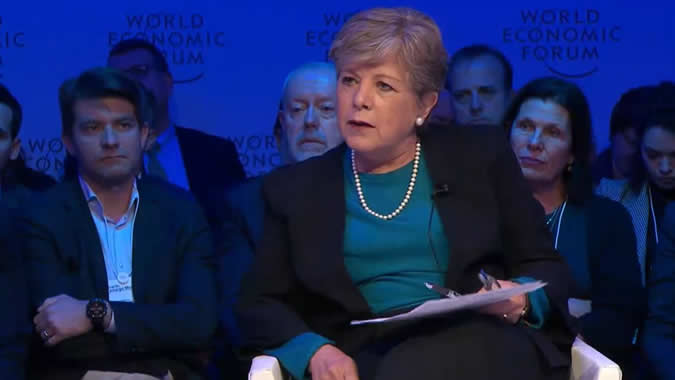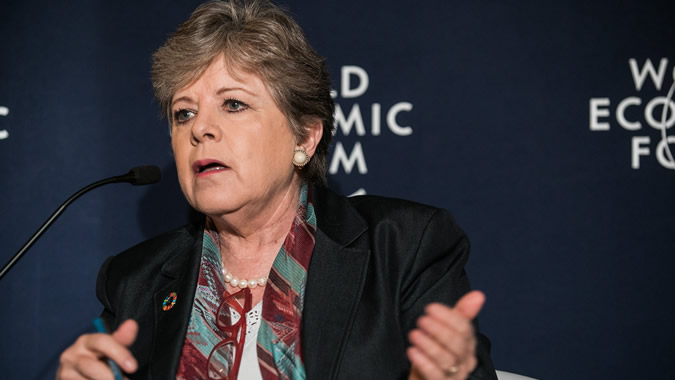Inequality and Low Growth Team Up and Conspire Against Development, Innovation, Inclusion and Productivity: Alicia Bárcena
ECLAC’s Executive Secretary is participating this week in numerous sessions of the annual meeting of the World Economic Forum, being held in Davos, Switzerland.

Inequality and low growth are teaming up and conspiring against development, innovation, inclusion and productivity, Alicia Bárcena, Executive Secretary of the Economic Commission for Latin America and the Caribbean (ECLAC), stated today while participating in the World Economic Forum (WEF), which will be held through Friday, January 24 in the Swiss city of Davos.
On Tuesday, January 21, the senior United Nations official acted as the moderator of a panel entitled Strategic Outlook: Latin America, which addressed the domestic pressures being faced by governments and the challenges for attaining a sustainable, prosperous and secure future in the region.
Also participating on the panel were the Economy Minister of Mexico, Graciela Márquez; the Economy Minister of Brazil, Paulo Guedes; the President of YPF and the Argentine government’s special envoy to WEF 2020, Guillermo Nielsen; and the Secretary-General of the Organization for Economic Cooperation and Development (OECD), Angel Gurría.
As part of her remarks, ECLAC’s Executive Secretary said that eight countries in the region changed their leaders in 2019, and that it was a historic year in terms of social unrest.
Economic growth decelerated in 18 of the 20 countries of Latin America, and in 23 of the 33 economies belonging to the region of Latin America and the Caribbean overall. The region grew 0.1% in 2019, and growth of 1.3% is forecast for 2020.
Bárcena added that while countries have made significant progress on poverty reduction, they have not made a comparable effort to fight inequality, the persistence of which is at the heart of the growing social demands and pressures that have emerged with intensity in various countries of the region.
“Inequality conspires against growth and it has recently given rise to conflicts due to unmet social demands, such as the insufficient provision of public goods and low levels of social protection,” she sustained.
Alicia Bárcena stressed that in recent decades, Latin America and the Caribbean has experienced striking growth in middle-income strata, which, nonetheless, continue to face numerous vulnerabilities, both with regard to their income and exercising their rights.
She specified that as of 2017, more than half of the adult population (52%) in middle-income strata had not completed 12 years of schooling, while 36.6% had occupations with a high risk of informality and precariousness. In addition, 44.7% of all economically active people in middle-income strata are not affiliated with or do not contribute to a pension system.
To tackle the scourge of inequality in the region, she said universal policies for social and labor inclusion are needed to contribute to increasing human capacities, productivity and economic growth, while also establishing a culture of rights and of social citizenship.
She added that the region needs a new social compact to serve as the political instrument for implementing, in a democratic context, policies and institutional reforms with a strategic, medium-term perspective, with fewer risks that they will be rolled back.
The participation of ECLAC’s Executive Secretary in the World Economic Forum 2020 continued today with diverse activities and bilateral meetings.
Meanwhile, on Wednesday, January 22, Alicia Bárcena will speak on a panel entitled Strategic Outlook: Emerging Markets, which will analyze the outlook for emerging markets in 2020 in a context in which foreign direct investment is at its lowest level since the 1990s.
On the morning of Thursday, January 23, she will moderate the Country Strategy Dialogue on Mexico, where she will address the Comprehensive Development Plan for El Salvador, Guatemala, Honduras and south-southeast Mexico, which ECLAC is coordinating at the behest of these four countries.
That afternoon, she will participate in a session entitled How to Turn Protest into Progress, where she will refer to the antigovernment protests that have taken place in some countries of the region and the world against entrenched inequality, corruption and political repression, and to how social movements can move from protest to political change in an effective way.
In the framework of her participation in the World Economic Forum, Alicia Bárcena will also hold a series of bilateral meetings with representatives of the public and private sectors at a global level.
Related content

ECLAC’s Executive Secretary Will Speak about the Region’s Situation at the World Economic Forum 2020
Alicia Bárcena will participate in numerous sessions during the four days of the annual meeting being held in Davos, Switzerland. She will present the Comprehensive Development Plan for northern…
Related link(s)
Country(ies)
- Latin America and the Caribbean
Contact
Public Information Unit
- prensa@cepal.org
- (56 2) 2210 2040